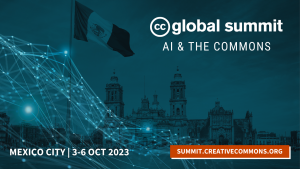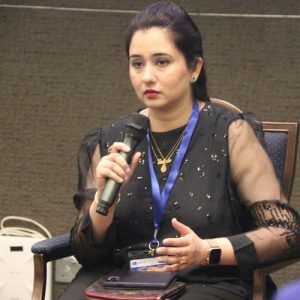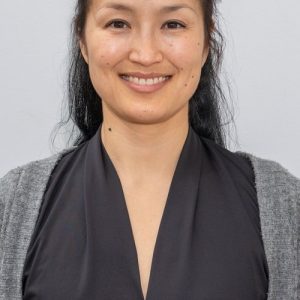There are too few nonprofit organizations like CC fighting for the commons – support our vital leadership with an end of year contribution. Donate today!
Meet CC’s 2023 Global Summit Committee Members
Events[lee esta entrada en español >]

“Creative Commons Summit 2023” by ProtoplasmaKid is licensed via CC BY 4.0.
After years of gathering online, the CC community is clearly eager to gather in person for CC’s 2023 Global Summit during 3–6 October in Mexico City, demonstrating that the work to open knowledge and culture is more popular and important than ever. We received 184 compelling responses to our call for proposals and over 300 requests for funding assistance to attend. Now people are receiving notifications about the success of their session proposals and scholarship applications and starting to plan their travel.
The overwhelming interest in this year’s Global Summit generated big challenges for the volunteers who stepped up from the CC community to shape the Summit’s program and participation. While it would have been wonderful to accept every proposal and application, the limits of funding, time, and space meant committee members had to make difficult decisions to try to form a Summit that we hope is diverse, enriching, and practical.
Throughout, the committees worked to try to make it possible for everyone to have some engagement with the Summit. While we decided it would be impractical to try to hold a fully hybrid event where both remote and in-person participants could engage together synchronously, we recognized that it was also impossible to bring everyone who might want to attend together in a single location.
Accordingly, we called for sessions to be held live in Mexico City and for experiences that people can access online, when and where they can. In addition to the panels, workshops, lightning talks, posters, and meetups that will happen at the Summit itself, participants will be recording videos for on-demand viewing and gathering in live online sessions both before and after the in-person sessions that will take place during 3–6 October. In short, there is a way for every compelling session to reach an audience — whether that’s just those present in Mexico City, or the worldwide public online. Given the high costs, travel restriction hassles, and environmental impacts of holding global events in single locations, beyond this year’s Summit we expect to continue to explore such varied practices to bring people together.
In all their decisions, the committees prioritized inclusion, working to balance scholarship recipients and invited sessions to reflect the diversity of the CC community. While taking factors like proposal quality, past contribution, and financial need into consideration, we also strived to balance the program and participants by country, region, language, gender, delivery format — emphasizing sessions that are collaborative, interactive, and/or break the mold of the classic speaker presentation — and subject matter — drawing on the Summit’s theme of AI & the Commons and topics including Better Internet, Contemporary Creativity, Culture & Heritage, Education, Journalism, and Scholarship & Science.
Please join us in thanking the program and scholarship committee members for their service! They gathered from all over the world — and all times of the day and night — to refine processes and review submissions to assist as many people as possible with funding to attend the Summit and to shape a program to represent many diverse activities in the commons that we hope will inspire, but not overwhelm.
If you haven’t registered for Summit yet, sign up to join us in Mexico City, or if you’re not sure you can travel there, register as a virtual participant to make sure you hear about and can join in all the online activities.
Program Committee

Amber Osman (she/her)
Ambassador, DOAJ
I am an open science advocate and my greater interests are in scholarly content and the publication ethics. I am actively involved in different international academic, research & publishing organizations and with the Higher Education Commission (Govt. of Pakistan). An award-winning journal editor for advancing the publishing process by adopting innovative research and publishing solutions.

Aysa Ekanger (she/her)
Open Access Advisor, UiT The Arctic University of Norway
I am based at the library of UiT The Arctic University of Norway and work mainly with Open Access-related topics. Giving advice about copyright and licensing issues is one of my tasks.
 Brian Ssennoga (he/him)
Brian Ssennoga (he/him)
CEO, Guild Digital
Brian is passionate mostly about 2 things: developing young leaders and the use of Information and Communication Technologies (ICTs) for Development. Brian currently serves as Director, Digital Health, for Last Mile Health’s Liberia Country Program, overseeing the adoption of the eCBIS (Community Based Information System) powered by the OpenSRP, a digital public good choice for public and private sector Community health digitization programs in Liberia. He is a founding member of the ICT Association of Uganda, and holds a Bachelor’s in Computer Science, a Postgrad diploma in Information Technology and an MBA (International Business). When not exploring the world through technology events and adventure, Brian loves to cook meals for family and friends, enjoy a good book, post a blog or play the guitar.
 Carlo Joseph Moskito (co-chair; he/him)
Carlo Joseph Moskito (co-chair; he/him)
Teacher, Instructional Designer, e-Learning Developer, Wikimedian, Philippines
Carlo is an educator and a free culture and open movement advocate from the Philippines. He has worked for several print publishing companies and an educational technology (edtech) company focusing on the content development of K to 12 instructional materials. Currently, he works for a USAID project on developing early grades reading materials in selected mother tongues in the Philippines. He is the lone member from the Philippines of the Creative Commons Global Network, a volunteer to several Wikimedia projects such as the Encyclopedia of Philippine Heritage, and a member of the Wikimedia Foundation’s Elections Committee.
 Irene Soria (she/her)
Irene Soria (she/her)
Embajadora, Creative Commons México
Irene is a PhD in the Feminist Studies Department at Universidad Autónoma Metropolitana in Mexico City. She is a part-time faculty member, academic, consultant, graphic designer and activist for the free software / free culture movement since 2009. Irene decided to explore and study her own practices when migrating to the exclusive use of free software as a graphic designer, which led her to the in-depth analysis of open knowledge, free access, the Commons and above all: social sciences crossed by feminism and decolonial studies. Around these topics, she has written a degree thesis, academic and general interest articles, books and compilations, as well as attended and presented at conferences in many countries. In 2018, she was invited to re-found the Creative Commons Mexico Chapter, which she represents at the Global Network Council, in addition to being a member of the CC Global Network Council Membership Committee and, lately, part of the ExCom.
 Jennifer Miller (she/her)
Jennifer Miller (she/her)
Independent Open Knowledge Advocate
As an independent civic technologist and open knowledge advocate, my activities currently focus on organizing civic tech volunteers at Code for the Carolinas, service on the board of FORCE11, and planning a sustainable future for Translate Science. My academic background is in public policy and technical communication, and I have completed the Creative Commons Certificate Program for Educators.
 Lía Rodríguez (she/her)
Lía Rodríguez (she/her)
Socióloga, TEDIC
Estudiante de Sociología, militante feminista de las ciencias sociales. Cuento con experiencia laboral en organizaciones sociales rurales y urbanas. Activista en ámbitos de la comunicación popular e inclusión digital de comunidades en situación de vulnerabilidad.
 Marcela Basch (she/her)
Marcela Basch (she/her)
Nexialist, LAIA
I am a journalist, educator and nexialist based in Buenos Aires, Argentina. Since 2013, I am focused on collaborative, free, and open culture. I founded El Plan C, the first website in Spanish focused on these issues. I co-founded Encuentro Comunes (Commons Conference) with the goal of spreading awareness about those initiatives. I write a newsletter, Diez palabras: new tendencies from a linguistics nerd perspective. I have been part of CCGN since 2017, the Gathering for Open Science Hardware (GOSH) since 2018, and Laboratorio Abierto de Inteligencia Artificial (LAIA) since 2023.
 Nate Angell (co-chair; he/him)
Nate Angell (co-chair; he/him)
Director of Communications & Community, Creative Commons
I’m an evangelist connecting people, ideas, and technologies to try to make things better, now leading communications and community at Creative Commons. I’ve worked across a wide variety of public and private institutions, focusing on community development, digital communications, meaningful education, open technologies, and sustainable growth. I live in Portland, Oregon, USA with some other cats and humans.
 Nyirahabihirwe Clementine
Nyirahabihirwe Clementine
General Secretary, Wikimedia Community User Group Rwanda
Nyirahabihirwe Clementine is Rwandese and holds a Bachelor’s degree from National University of Rwanda, in the faculty of Economics and Management, Economics Department. She started contributing on Wikimedia projects in 2019 and is one of the four founders of Rwanda Wikimedia community user group, acting as General Secretary in the executive team. She used to organize and coordinate many different Wikimedian projects in my community (eg, Wikipedia Pages Wanting Photos, Wiki Loves Monuments , Wiki Loves Women, Wiki Loves Africa, Wiki Loves Folklore).
 Prodip Roy
Prodip Roy
Library Officer. RMIT University
I have been a library professional in local and state Governments and the tertiary education sector in Australia and Bangladesh for nineteen years. As the founder and Editor in Chief, I lead The Librarian Times team in implementing its vision and mission. I was the founder and President of the Bangla Language and Cultural School in Adelaide, South Australia, from 2013 -2015. I served as a Co-Chair for Special Interest Group-International Information Issues (SIG-III) of The Association for Information Science and Technology (ASIS&T) for three consecutive years from 2018 to 2021. I am serving as an ASIS&T Governance Committee member for 2022-2023. I have been a Creative Commons Global Network and CC Australia chapters member for the last few years.
 Thalia Rahme (co-chair; she/her)
Thalia Rahme (co-chair; she/her)
Independent Communications Consultant
A city goat, originally from Beirut, but currently living in Marseille. A former journalist, yet an unrepentant storyteller. A versatile comms person who’s into management. I’m interested in bridging between languages and technology and making information accessible to whomever needs it in the appropriate format. Currently learning 한국어 My Achilles heel is design but I haven’t lost hope yet 🙂
Scholarship Committee
 Eunice Mercado-Lara (she/her)
Eunice Mercado-Lara (she/her)
Civic Science Fellow, The Open Research Funders Group
I’m a Civic Science Fellow at the Open Research Funders Group, where I lead the Open & Equitable Model Funding Program, a research funders’ community of practice to pilot interventions to make grantmaking practices more equitable and incentivize open and collaborative scholarly practices. I have worked in the public sector to help government funding agencies in North and Latin America align incentives and policies to advance open research. I have served as a board and committee member in several international organizations and initiatives advocating for open scholarship practices, such as CERN’s SCOAP3 initiative, the Open Access Week, and the OpenCon LATAM.
 Ivan Martínez (he/him)
Ivan Martínez (he/him)
Creative Commons México and R3D
Human rights defender and long-time free and open knowledge activist. Currently Creative Commons México Coordinator.
 Lia P. Hernández Pérez (she/her)
Lia P. Hernández Pérez (she/her)
Co-Founder, Creative Commons Panama Chapter
I am the founder of the Panamanian chapter of Creative Commons. Since 2014, I have been a very active actor promoting the use of CC licenses in the local and regional community.
 Mari Moreshead (she/her)
Mari Moreshead (she/her)
Chief of Staff, Creative Commons
Mari came to CC in 2015 after three years at the Mozilla Foundation. Prior to that, she held similar administrative roles at a legal technology start up and the Playful Invention Company. She leads staff engagement, hiring, and other CC operations. She’s lived in a few Canadian cities but now calls Toronto home where she lives with her cats. When she’s not at her desk, she’s quilting.
 Max Wardeh (he/him)
Max Wardeh (he/him)
Founder and CEO, Open Knowledge Connective
Interested in finding ways to get people in different areas of open culture (education, software, hardware, media, archives) to collaborate and grow the movement. Helping build Internet of Production Alliance, Open Knowledge Connective, and Less Impact. Teaching at Loughborough University London and OpenClassrooms.
 Olalekan Isaac Olatunde (he/him)
Olalekan Isaac Olatunde (he/him)
Executive Secretary, Wikimedia Nigeria Foundation
Olatunde Isaac is a Nigerian scientist, food safety specialist, open knowledge advocate and social entrepreneur. He’s a long-term Wikipedia editor and Wikimedia community manager in Nigeria. Isaac is a versatile personality whose works in the open movement, specifically on Wikipedia, have been extensively covered by national and international media and have received numerous accolades for his contributions. He is one of the most prolific contributors to Wikipedia in Africa, and in 2015, he founded Wikimedia User Group Nigeria (now a charitable organization in Nigeria) that focuses on promoting Wikipedia and other Wikimedia projects in Nigeria.
 Sami Mlouhi
Sami Mlouhi
CC Global Network Member
I’m Sami Mlouhi, a CC network member living in Tunis, Tunisia. I’m a Wikimedian and an advocate for open knowledge all over the world.
Posted 04 August 2023